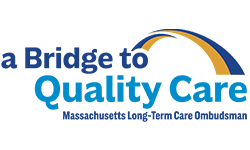How LifePath’s Ombudsman Program Protected a Nursing Home Resident from an Unsafe Discharge

When “Rosa,” a longtime resident of Western Massachusetts, found herself in a nursing home recovering from a health crisis, she believed she was on the right track to regaining stability and well-being. However, she soon faced an unexpected and frightening challenge—she was told she had to leave the facility, even though she was not ready to return home safely.
Rosa, who lives with serious, chronic conditions, had long struggled to navigate the medical system. She had entered the nursing home for rehabilitation, working toward regaining the strength and skills needed to live independently again. But before she could reach her recovery goals, the facility informed her that Medicare would no longer cover her stay. As a result, they expected her to leave—even though her home was not only unprepared for her return but also unsafe.
Fortunately, Rosa had an advocate on her side: LifePath’s Ombudsman Program. Long-Term Care Ombudsmen work with nursing home or rest home residents, as well as with their families and friends, on behalf of the resident. Services and all conversations with ombudsmen are confidential. Ombudsmen are trained in areas like nursing facility regulations, negotiation, and much more. They are assigned to specific nursing homes and visit each site weekly. Services are provided free of charge to residents, their families and friends, and their substituted decision-makers like health care agents, attorneys-in-fact, and guardians.
Thanks to the Ombudsman’s advocacy, Rosa’s discharge was halted.
Years earlier, the Ombudsman Program Director (Ombudsman) had helped Rosa enter the Personal Care Attendant (PCA) program, and when her PCA reached out for help, the Ombudsman knew exactly what to do.
First, the Ombudsman reminded the facility of an important fact: under federal and state regulations, they could not force Rosa to leave just because her Medicare coverage had ended. Resident’s beds are dually certified, meaning that when their Medicare coverage ends, residents can remain at the facility under their Medicaid benefits. Additionally, Rosa clearly qualified for continued care based on her functional status. The facility had no grounds to discharge her simply because she was no longer covered by her Medicare benefits.
Then, when the facility warned Rosa that she would lose her PCA services if she stayed, the Ombudsman took action again. Reaching out to the PCA Program Director at LifePath, he confirmed that the PCA program would facilitate Rosa’s re-entry to the program when she was truly ready to return home.
Thanks to the Ombudsman’s advocacy, Rosa’s discharge was halted. She was able to remain in the facility, continue her rehabilitation, and secure Medicaid coverage for her ongoing care. Most importantly, she gained the time needed to ensure that her home would be a safe place to return to when she was truly ready.
Rosa and her PCA are deeply grateful to LifePath’s Ombudsman Program for stepping in when they needed it most. This case is just one example of how Ombudsmen work to protect the rights, dignity, and well-being of long-term care residents.
The Ombudsman Program receives funding from the Older Americans Act (OAA). The Older Americans Act, which funds many local programs for older adults and caregivers, including the Ombudsman Program, has not been reauthorized. This Act, which has historically had bipartisan support through many federal administrations, was on track to be passed at the end of last year, but was derailed following the election.
Getting Involved and Supporting the Older Americans Act
If you’d like to support the continuation of the Older Americans Act to make sure programs for older adults and caregivers, including the PCA program, continue to receive funding, there are several ways to get involved. OAA programs rely on volunteers to keep them going. Whether it’s delivering meals, providing phone companionship, or offering your expertise, volunteering with LifePath will have a positive impact on elders in your community.
Additionally, you can advocate for the OAA. Consider contacting your federal representatives to encourage them to continue funding and supporting its programs. This is especially important if you’ve participated in LifePath programs. Thank them if they’ve supported the OAA in the past, and tell them that the U.S. Congress should provide full funding for the OAA in future appropriations so that it can keep pace with our nation’s growing population of older adults.
Donations to organizations that work closely with older adults can also make a difference. Your financial support can help ensure that the services provided by the OAA continue to thrive and reach those who need them the most. To donate to LifePath, please visit our website.
As an Area Agency on Aging (AAA), LifePath has been designated by the state to address the needs and concerns of all older persons at the regional and local levels. As such, LifePath is required to have an Advisory Board made up of older adults from the local community who volunteer their time and expertise. The Advisory Board plays a crucial role in shaping the services and programs offered by the agency. Their insights, experiences, and suggestions help ensure that the needs and preferences of older adults are considered. They provide valuable feedback on the effectiveness of existing programs and suggest new ideas that could better support the aging population. LifePath is always interested in hearing from older residents about interest in serving on its Advisory Board. Contact Lynne Feldman, Associate Executive Director, at 413-773-5555, for more information.
With continued support from the Older Americans Act, LifePath’s Ombudsman Program can keep making a difference in the lives of people like Rosa, ensuring they receive the care they deserve and their rights are respected, and do not face unsafe situations that could jeopardize their health and well-being.
Ombudsman Program services are always confidential. Names have been changed and specific details omitted.